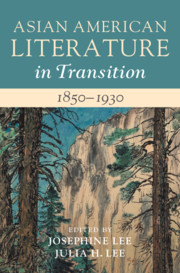Book contents
- Asian American Literature in Transition, 1850–1930
- Asian American Literature in Transition
- Asian American Literature in Transition, 1850–1930
- Copyright page
- Contents
- Illustrations
- Notes on Contributors
- Series Preface
- Introduction: Asian American Literature in Transition, 1850–1930
- Part I Empire and Resistance
- Part II Bodies at Work and Play
- Part III Crossings
- Chapter 12 Affect and Form in the Writings of the Eaton Sisters
- Chapter 13 Osato-san’sHands
- Chapter 14 Revolutionary Formalisms
- Chapter 15 Slave to Love
- Chapter 16 Anna May Wong’s Greetings to the World
- Bibliography
- Index
Chapter 14 - Revolutionary Formalisms
from Part III - Crossings
Published online by Cambridge University Press: 27 May 2021
- Asian American Literature in Transition, 1850–1930
- Asian American Literature in Transition
- Asian American Literature in Transition, 1850–1930
- Copyright page
- Contents
- Illustrations
- Notes on Contributors
- Series Preface
- Introduction: Asian American Literature in Transition, 1850–1930
- Part I Empire and Resistance
- Part II Bodies at Work and Play
- Part III Crossings
- Chapter 12 Affect and Form in the Writings of the Eaton Sisters
- Chapter 13 Osato-san’sHands
- Chapter 14 Revolutionary Formalisms
- Chapter 15 Slave to Love
- Chapter 16 Anna May Wong’s Greetings to the World
- Bibliography
- Index
Summary
In this chapter, I argue that Asian American modernists Yone Noguchi, Sadakichi Hartmann, and José Garcia Villa experimented with the orientalist styles that were made popular by poets Walt Whitman and Ezra Pound. Writing during the period of Asian exclusion in the USA (1882-1946), these three poets responded to the ideological contradictions between elitism and universalism that were present in Whitman’s and Pound’s poetry by calling for a more democratic and egalitarian America. Noguchi’s and Hartmann’s Japanese American haiku and tanka and Villa’s style of “reversed consonance” — “a new method of rhyming…which has never been used in the history of English poetry” — also articulate a queer diaspora that exposes heteronormative structures of power and calls on the USA to be more inclusive of racial and gay others. They do so by using nonbinary motifs in their poetry which critique the binary structure of racial exclusion: native/foreign. These nonbinary motifs are what theorists Gilles Deleuze and Félix Guattari call “rhizomatic,” which is a theoretic concept that organizes ideas through nonhierarchical multiplicities. The rhizomes of their poetry are composed of “deterritorializing” the normativity of Asian exclusion and heterosexuality and “reterritorializing” the American landscape through inclusion. Despite their politics of inclusion, their works problematically objectify women.
Keywords
- Type
- Chapter
- Information
- Asian American Literature in Transition, 1850–1930 , pp. 245 - 263Publisher: Cambridge University PressPrint publication year: 2021

